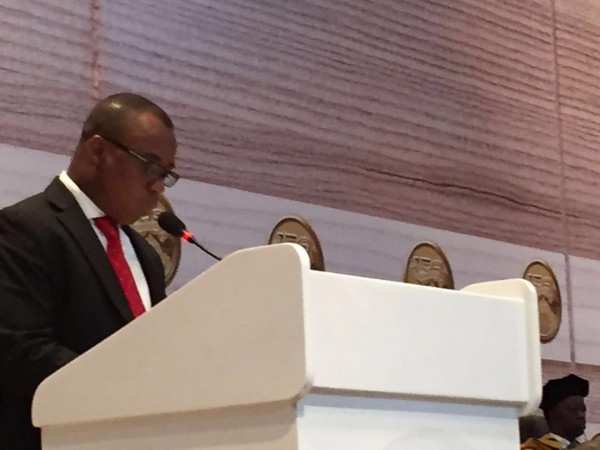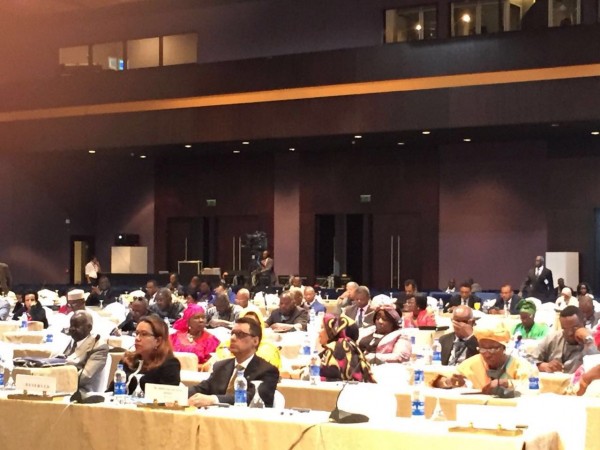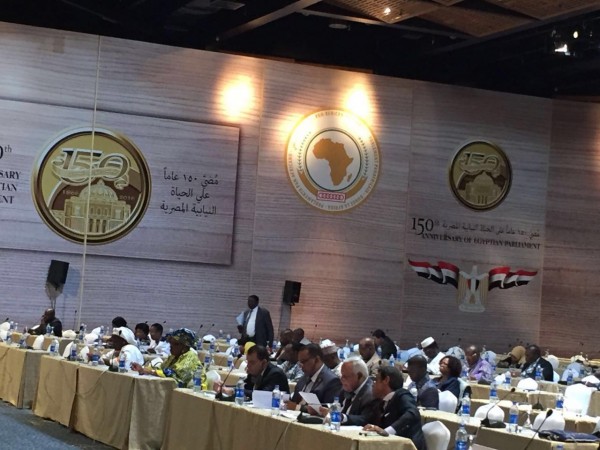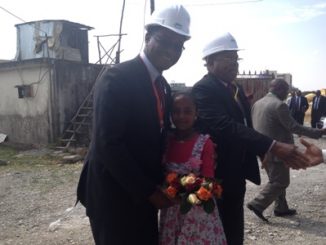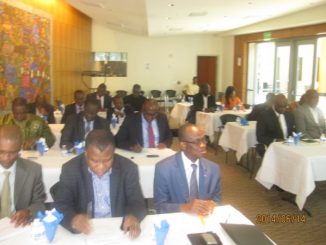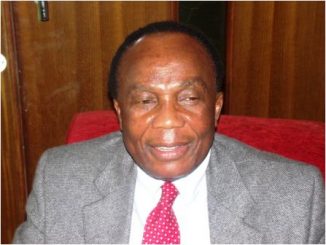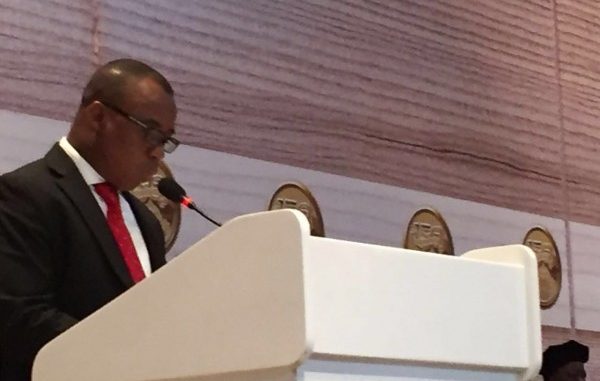
Ambassador Kamara addresses the Pan-African Parliament on behalf of the African Union Peace and Security Council

Sierra Leone’s Ambassador to the Federal Democratic Republic of Ethiopia and Permanent Representative to the African Union, Mr. Osman Keh Kamara, made a presentation on behalf of the African Union Peace and Security Council (PSC) at the 3rd Ordinary Session of the 4th Parliament of the Pan-African Parliament which took place on Thursday 13th October, 2016 in Sharm-el Sheikh, Egypt.
Ambassador Kamara delivered a statement on the topic: “The Status of Peace and Security in Africa’’.
In his presentation, Ambassador Kamara briefly made a case for the replication of His Excellency President Dr. Ernest Bai Koroma’s revered gender policy across the continent as an essential model for sustainable peace and security on the continent.
Ambassador Kamara highlighted that if President Koroma’s policy towards the vulnerable group is replicated across the continent (particularly in post conflict countries) it would have the multiplier effect of bridging inequality, increase inclusivity in governance and constitute a quintessential foundation for durable peace and stability in Africa.
Abdul Karim Koroma
Information Attaché
Embassy of the Republic of Sierra Leone
Addis Ababa
Ethiopia
Presentation of the Peace and Security Council of the African Union to the Pan African Parliament on the status of peace and security in Africa By
Ambassador Osman Keh Kamara, Permanent Representative of Sierra Leone to the African Union
13th October, 2016.
Sharm-El-Sheikh, Egypt
Honourable President of the Pan‐African Parliament,
Honourable Members of the Pan‐African Parliament,
Distinguished Ladies and Gentlemen,
Greetings to you all.
On behalf of the Peace and Security Council (PSC) and on my own behalf, I would like to first of all, express my sincere gratitude to the Pan African Parliament (PAP) for inviting the Chairperson of the PSC to participate in this 3rd ordinary session of the 4th Parliament of PAP. I am here to represent the Chairperson of the PSC for this month, H.E. Amb. Catherine Muigai Mwangi of the Republic of Kenya, who is currently attending the Extraordinary Session of the Assembly of the African Union on Maritime Security, Safety and Development in Lome, Togo. She sends many regards and best wishes to PAP and looks forward to successful deliberations in this session.
Permit me Hon. President and Hon. Members of Pan-African Parliament to extol the intrinsic worth of the leadership of my President His Excellency Dr. Ernest Bai Koroma for His revered gender policy which is designed to capacitate, empower and promote women, youths and the disabled in senior positions within Sierra Leone, regional, continental and international institutions. His policy towards the vulnerable group if replicated across the continent (particularly in post conflict countries) has the multiplier effect of bridging inequality, increase inclusivity in governance and constitute a quintessential foundation for durable peace and stability in Africa.
The Peace and Security Council appreciates this tradition of your esteemed Parliament,of inviting the Chairperson of the Council to your sessions. This mechanism promotes coordination and synergy in our efforts as AU organs within the framework of the African Peace and Security Architecture, which is our blue print for promoting peace, security and stability on our continent. Africa has recently adopted Agenda 2063 and we must do everything within our means to ensure realization of the goals of this Agenda.
It is an honor for me to present to the esteemed Parliament the current status of peace and security situation in our continent. Since the last Session during which the PSC Chairperson briefed the Parliament on the status of peace and security in the continent, the PSC has continued to deploy sustained efforts to consolidate the progress made in promoting lasting peace, security and stability on the continent. While progress has been made in resolving some of the conflict and crisis situations in the continent, with the support of the Commission, the Regional Economic Communities/Regional Mechanisms for Conflict Prevention, Management and Resolution (RECs/RMs) and partners, many challenges evidently remain on the continent’s peace and security landscape.
Over the past decade, the threat of terrorism in Africa has grown significantly and continues to grow in various parts of Africa. Headlines bear grim stories of terrorist attacks against innocent civilians in Libya, Tunisia, Egypt, Mali, Nigeria, Burkina Faso, Cameroon, Chad, Somalia and Kenya, to name a few. The notorious and so-called Islamic State militant group in the Middle East has also expanded its influence in Africa. In Libya, the terrorist group is taking advantage of the current crisis, which is also compounded by the absence of effective central government to recruit, train and expand its presence in our continent. Relationships between the various terrorist organisations on the continent remain murky and the collective impact of their actions amount to a serious threat to our peace and security and a test to Africa’s collective will and ability to decisively combat and eradicate terrorism.
Hon. President, Hon. Members,
Besides terrorism, the general peace and security situation in our continent is still a challenge which needs our coordinated efforts. I will provide a brief overview of the main peace and security challenges which the Council has been seized with and continues to be.
In South Sudan, the overall political, security, and humanitarian situation remains volatile, despite the signing of a peace Agreement by the warring parties in August 2015. As the Parliament is aware, from 7 July 2016, there have been deadly clashes between the SPLM-IG and the SPLM-IO in the capital city of Juba. In the past few days, there has not been any glimmer of hope that this conflict will relent. Given this disturbing and unpredictable situation, more needs to be done to ensure that the Agreement is fully implemented and the parties comply with the various provisions of the Agreement. We encourage the countries of the region to intensify engagement with the Parties to secure a return to peace.
The countries of the Region, through IGAD, have made a decision to deploy a Regional Protection Force to protect civilians. This decision has been supported by the Council and the UN Security Council. Efforts are currently under way to deploy the Force. The AU, through the former President Alpha Oumer Konare, has been playing a significant role in ensuring the implementation of the Peace agreement in South Sudan. The Peace and Security Council will visit South Sudan by the end of this month to gather information on the ground and express its solidarity with the people and Government of South Sudan. But of utmost importance is that the South Sudanese themselves ought to make the peace in their country, as nobody else can do that.
In Burundi, the situation remains unpredictable despite emerging signs of improvement in security situation, especially in the capital city Bujumbura. Only an all-inclusive and unconditional inter-Burundian Dialogue, based on the respect of the Arusha Agreement and the Constitution of Burundi will make it possible to find a lasting political solution to the current crisis. The dialogue in Arusha, Tanzania under aegis of the East African Community with facilitation of former President Benjamin Mkapa of Tanzania has resumed, though some impediments on the conduct of an inclusive dialogue persist. There has been a resistance from the Government side to allow those in prison to participate into dialogue. The efforts by the East African Community (EAC) leaders and the EAC Mediator, HE President Yoweri Kaguta Museveni, President of the Republic of Uganda to help the Burundians find a lasting solution to the crisis have been deployed. The AU Commission is currently pursuing efforts for the deployment of Human Rights Observers and Military Experts in Burundi as agreed between the Government and the AU High Level Delegation of Heads of State that visited Burundi in February this year. Unfortunately, only 68 Human Rights Observers and Military Experts are deployed. The consultations and other procedures are underway to increase this number to 200 in spite of financial challenges. The PSC visited Burundi in June 2016 and it has been making decisions to ensure that the situation in Burundi comes to its normality.
In Somalia progress has been made in the political process with the implementation of Vision 2016, towards the holding of elections which were planned to take place in August/September 2016, based on a consensual electoral model as established by the Somali stakeholders. The state formation process is almost completed. Though, it must be noted that the process of state formation continue to face clan conflicts as opposing clans compete for influence, power and land. AMISOM continues to support efforts to improve the humanitarian situation by opening up main supply routes to facilitate the delivery of humanitarian assistance.
Al Shabaab has been heavily degraded and weakened, but retains the capacity to stage deadly attacks, as evidenced by its recurrent attacks. Of particular concern is the fact that the EU has reduced its funding for AMISOMtroop allowances by 20%. Although it has enhanced the payment procedures to AMISOM Troop Contributing Countries through a lump-sum payment approach aimed at accelerating disbursement. This measure does not fill the gap created by the 20% cut. Also, the EU decision to alter the payment procedure of troop allowances to the Burundi National Defence Force (BNDF) contingent could adversely impact on the effectiveness of AMISOM operations. Given these challenges, the PSC has called on the UN Security Council to enhance financial support to AMISOM through the utilization of UN assessed contributions, bearing in mind that in deploying a Mission in Somalia, the AU is acting on behalf of the UN Security Council, which has the primary responsibility for the maintenance of international peace and security, and aims at creating conditions conducive for long-term stabilization and reconstruction of Somalia. The PSC has also endorsed the revised AMISOM Concept of Operations (CONOPs), focused on efforts toward enhancing AMISOM and Somali National Security Forces operations and setting indicative timelines for an exit strategy of AMISOM from Somalia.
In the Democratic Republic of Congo (DRC), the situation remained marked by issues related to the electoral process, the conduct of the National Political Dialogue and the continued insecurity in the provinces in the East of the country. The AU appointed the former Prime Minister of Togo and Panel of the Wise Member, Mr Edem Kodjo as the facilitator in the Congolese National Dialogue. The countries of the Region are deploying efforts to persevere in the implementation of the Framework Agreement, thus enhancing their cooperation to neutralize the negative forces operating in the east of the DRC.
In Mali and the Sahel, thesituation has been marked by the pursuit of efforts to implement the Agreement for Peace and Reconciliation in Mali.The security situation in Mali has been characterized with the terrorist attacks in Mali against the Malian armed forces, the international forces, MINUSMA and Operation Barkhane. The Peace and Security Council has welcomed the new dynamics noted in the implementation of the Agreement issuing from the Algiers Process and encouraged the Malian parties to redouble their efforts to promote lasting peace and reconciliation in Mali. More than ever, there is a need for the speedy establishment of an Intervention Force to be deployed in northern Mali, to combat terrorist and criminal groups operating in this part of the country. This is what the AU Commission has started working on and the Peace and Security Council will be briefed after the finalization of the consultations regarding the establishment of an Intervention Force to be deployed in northern Mali, to combat terrorist and criminal groups.
In Libya, the situation in Libya continues to be of utmost concern. The political, security and humanitarian situation requires our attention. The AU continues to closely follow the situation to make sure that the Libyan Political Agreement (LPA) is fully implemented, that the Governing National Authority (GNA) secures the necessary endorsement from all Libyan stakeholders and the need for a better coordinated international action. Looking ahead, the AU, through the High Representative for Libya, former President of Tanzania, Jakaya Kikwete intends to play an enhanced role both in assisting the new Libyan Government through concrete actions, including assisting in security sector reforms and national reconciliation. The AU also intends to contribute to the strengthening of existing regional security arrangements, including the Nouakchott Process as an intelligence gathering and sharing platform, to better prevent extremist groups from launching attacks in the region and in the neighbouring countries.
In the Central African Republic (CAR), the political and security situation has improved considerably, following the successful organization of the presidential and legislative elections and the establishment of a new government. It was in this context that the PSC, at its 586th meeting, held on 31 March 2016, decided to lift the suspension of the participation of the CAR in the activities of the AU, as well as all other measures taken to ensure that stakeholders in the CAR work irreversibly for the restoration of the normal constitutional order.
However, the security situation is still marked by incidents of violence and abuses committed against the population by unidentified armed individuals, who often operate with elements of the terrorist group Lord’s Resistance Army (LRA). It is in this context that the LRA still continues to pose a threat to peace and stability in the CAR and its eradication requires increased African and wider international cooperation. The humanitarian situation has improved significantly. Notably, the number of IDPs has declined significantly since February 2016, but there are still thousands of Central African refugees, mainly in the neighboring countries. The country continues to face shortage of food. It is estimated that about 2.35 million people are in a situation of food insecurity, and also needing health care support and access to safe drinking water. Yet, the post conflict reconstruction demands in the country are huge and require our support.
In Sudan, the situation relating to the National Dialogue, cessation of hostilities in Darfur and the two areas of Blue Nile and Southern Kordofan remain unresolved to date. Of significance was the signing of a Roadmap Agreement, which captured key concessions that had been made by the Sudanese parties. On 21 March 2016, the Government of Sudan (GoS) signed the Roadmap Agreement and the African Union High Representative (AUHIP) also signed as witness. The opposition parties and the armed movements expressed reservations over the document and are yet to sign it. On 18 April 2016, the Sudan Call, comprised of some Sudan opposition parties and armed movements, unilaterally declared a cessation of hostilities in the Blue Nile and South Kordofan States, for a period of six months. Subsequently, the GoS also made a similar announcement, for a period of 4 months, starting from Saturday 18 June 2016.
At the same time, Darfur has faced further challenges from January 2016, when fighting erupted between the Sudan Armed Forces (SAF) and the Sudan Liberation Army of Abdul Wahid Nur (SLA/AW), in the Jebel Marra area of Central Darfur at the initiative of this Movement. Following these clashes, the African Union/United Nations Hybrid Operation in Darfur (UNAMID) reports indicated that the clashes resulted in the displacement of over 100,000 people. Meanwhile, the UNAMID continued to implement its given mandate, albeit with some challenges. In June 2016, the AUPSC and the UNSC renewed the mandate of UNAMID for another period of 12 months.
In April 2016, an administrative referendum was conducted by the Government of Sudan (GoS) to determine whether Darfur should be a unitary state or retain the five states. On 23 April 2016, it was announced that more than 97% of voters supported the option of maintaining the five states structure. The AU Commission observed the referendum and reported that it was peaceful. In May 2016, the Joint Working Group (JWG) established in 2015 by the AU, UN and the GoS, to develop a strategy that would lead to a smooth exit of UNAMID, visited Darfur and agreed that there was some improvement in the security situation. The JWG agreed to resume its work on 17 October 2016.
In Western Sahara, the conflict, which has been on the decolonization agenda of the United Nations for over fifty years, remains unresolved to date. The continuing impasse prompted the outgoing UN Secretary-General, Mr Ban Ki-Moon to visit the region in April 2016 where he cited the threats posed by extremists and terrorist groups operating across borders, the growing frustrations and deterioration of the humanitarian situation in the camps as worrying developments. Morocco, which did not welcome the outgoing Secretary-General’s visit, expressed its disaffection over the use of the word “occupation” by the Secretary-General during his visit, accused Mr Ban Ki-moon of partiality and expelled 81 MINURSO and 3 AU personnel within a 72 hour deadline, therefore throwing MINURSO and the entire peace process into total paralysis. The AU’s position is clear in this case. Western Sahara is a case of de-colonization in our hands and needing urgent solution to ensure that the Saharawis obtain their political rights through a self determination referendum.
Hon. President, Hon. Members,
As we work towards creating conditions conducive for durable peace, security, stability and prosperity of our continent, we also have a fundamental obligation to respond positively, wherever possible, to the constant and legitimate demands of our people including the respect and promotion of human rights and fundamental freedoms. This is one of the best approaches of preventing violent conflicts and instability in our continent.
It is noteworthy that more and more of our member states are conducting peaceful elections, often accompanied by peaceful handover of power. Africa has stood firm against unconstitutional changes of government. The success in this aspect should extend to the entire political space of our countries, especially through consolidating peaceful handover of power and ensuring smooth political succession. In all these efforts, Africa must mobilize robust early response to brewing crises, wherever on the continent.
In order to achieve our goal of silencing the guns by 2020, it is critical that we strengthen our ability to carry out preventive diplomacy and mediation. I wish to take this opportunity to encourage Organs of our Union to take advantage of tools availed to them by the Commission to tackle structural conflict prevention. We have witnessed a remarkable decision by our heads of State and Government on the Peace Fund during the 27th Ordinary session of the AU held in July in Kigali, Rwanda. It is time for us Member States to make use of the proposals in the Report of Dr Kaberuka on the Peace Fund, to find resources from within and be able to resolve crises/conflicts for a peaceful continent. Let me conclude by reiterating PSC’s appreciation to the Pan-African Parliament for its unwavering commitment to discharge its mandate and I wish this session fruitful deliberations.
I thank you all.

